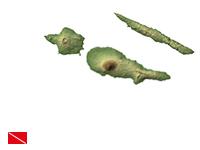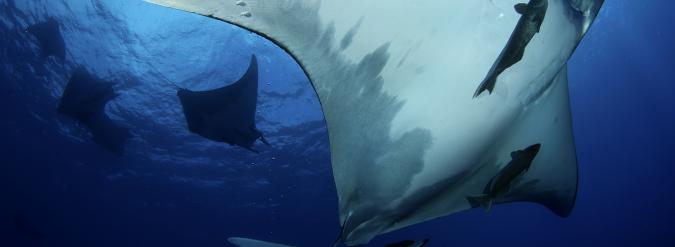Princesa Alice
Description
By boat
180 minutes from the Horta Harbour (Faial) or from Madalena (Pico)
Depth

Princesa Alice
The Banco Princesa Alice (Princess Alice Bank) is considered one of the best and most well-known dive sites of the Azores. Only recommended for experienced divers, it is far from a harbour and prone to strong currents. It also requires diving to considerable depths.
Departing from the Horta Harbour or from Madalena, the long trip (about 3 hours) to cover the 45-50 miles that separate this bank from Faial and Pico, gives ample opportunity to spot whales, turtles and seabirds, in addition to friendly dolphins that escort the bow of the boat.
This seamount is a large area with depths of between 30-40 metres, dropping abruptly in places. Normally diving takes place near the anchor cable from where you should descend and return. Visibility can reach up to 40 metres and there is a great variety of life that can be sighted even from the surface, including majestic devil rays (Mobula tarapacana) and pelagic species such as Atlantic bonito (Sarda sarda) and Almaco jack (Seriola spp.).
Focus should also be on the water column. From 5 metres depth you are surrounded by the largest pelagic fish as well as big groups of devil rays, giant mantas (Manta birostris) and even by sharks, particularly the Galapagos shark (Carcharhinus galapagensis).
The beginning of this reef is about 35 metres deep and you can see common species of the Azorean seafloor, such as island groupers (Mycteroperca fusca), large dusky groupers (Epinephelus marginatus) and barred hogfish (Bodianus scrofa), as well as colourful ornate wrasses (Thalassoma pavo), Mediterranean rainbow wrasses (Coris julis) and blacktail combers (Serranus atricauda).


